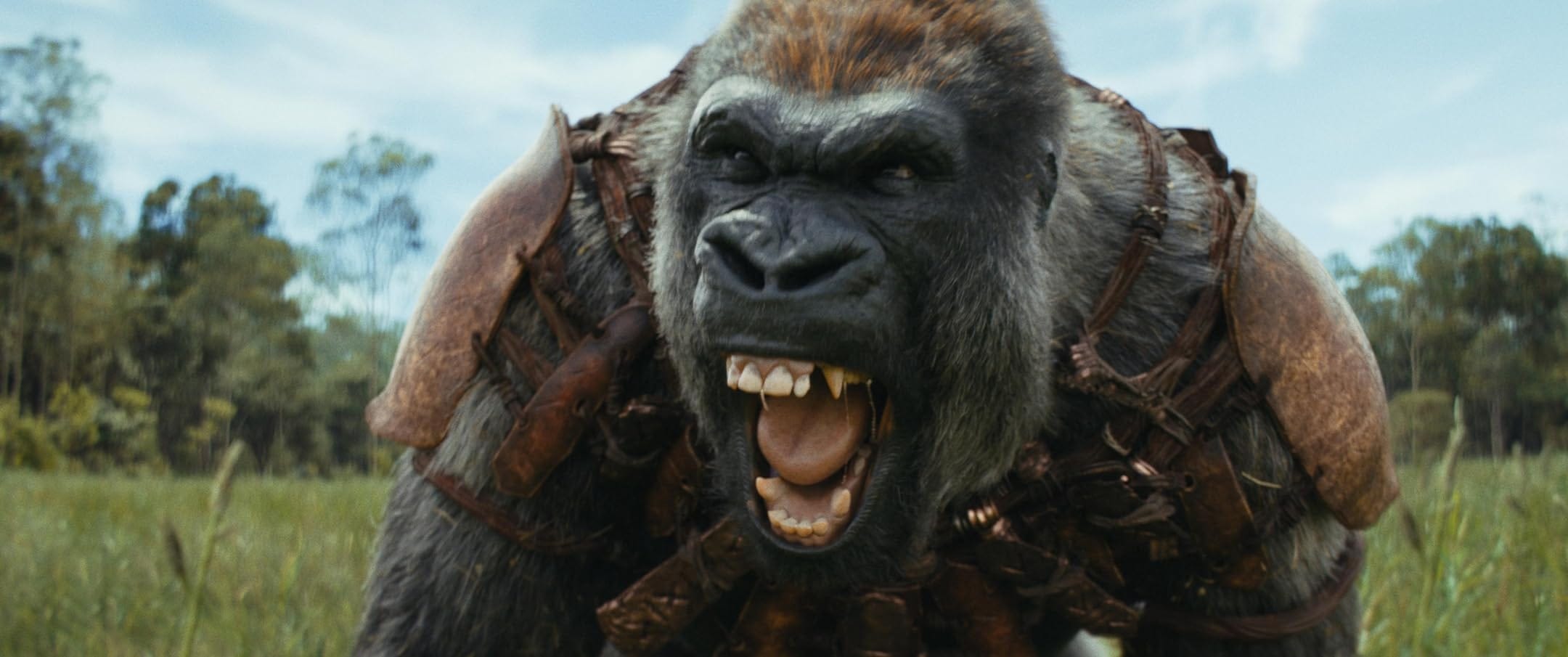‘Kingdom of the Planet of the Apes’ Review
Apes together wrong.
[Some spoilers for Kingdom of the Planet of the Apes follow.]
Kingdom of the Planet of the Apes is a great-looking flick and a solid-enough chase-movie with an interesting idea or two at its core that nevertheless feels a little like a two-plus-hour prologue for a bigger, more fulfilling movie.
One way to think of Kingdom of the Planet of the Apes is that it’s a little like the original 1968 film but filtered through the perspective of the apes rather than Charlton Heston’s astronaut. After a title card recapping the events of the three previous films, we open in a village of apes who raise eagles as hunters. Director Wes Ball and writer Josh Friedman quickly give us a sense of their society, of how they, and the environment in general, have harmonized with a post-human Earth. Ruined skyscrapers serve as aeries for eagles; dark tunnels lead to forbidden valleys; and the rump of dumb, savage humans are called “Echoes” by the young chimp Noa (Owen Teague) and his clan. When one of these Echoes steals a blanket and infiltrates his village to pilfer some fish, it draws the attention of marauding enemies who, in Caesar’s name, destroy the village and enslave those who live here.
And thus the scene is set: Noa must track and save his clan, all while learning about this mysterious “Caesar” and whether or not humans and apes can coexist in a world where apes have gained intelligence but not mastered the tools left behind by humanity.
As I said, there are interesting ideas nestled within the film. Consider the role of Caesar: Like a combination of Christ and Augustus, Caesar is, generations later, a near-mythical elder, one who many tribes have forgotten and others have twisted to their own needs. Raka (Peter Macon) is a monk of sorts, preaching that mercy must be shown to the humans because Caesar, supposedly raised by one, believed they could live together. Proximus Caesar (Kevin Durand) has taken on the mantle of lawgiver and warrior; he learns the secrets of the old world from Trevathan (William H. Macy), and seeks to capture the human Mae (Freya Allan), who was traveling to Proximus’s compound to retrieve something from a vault the warrior-king has been attempting to break into.

That’s right: There remain humans who can speak, who can think. As I said, imagine The Planet of the Apes, but a version from the point of view of Dr. Zaius, one in which we understand why he is shocked to stumble upon humans who can speak. Between Trevathan and Mae, we see the two paths forward for humanity: a sort of diminished, court-jester–like stature in which the remnant of humanity teaches apes how to use human tools; or as part of an active resistance attempting to rebuild human civilization from the ruins and reclaim the world from the apes who now dominate it.
But we only glimpse this conflict; the whole film feels like a prelude to a larger struggle. I have to be honest: I’m not that invested in the ups and downs of ape society, which, despite being granted intelligence and the ability to understand language, has done nothing with the gifts. Proximus and Raka at least seem to understand that apekind has regressed in the generations following Caesar’s death, that their lack of technology—be it books to transmit knowledge down through the generations or weapons to expand dominion over the planet—limits their ability to thrive and flourish. Meanwhile Noa, our protagonist, is content to play with his birds.
I know we’re supposed to admire Noa’s ability to live in harmony with nature and support his desire to live in isolated peace. Good for him, I guess, but a conflict-free existence makes for dull storytelling. I’m more interested in Mae and Trevathan and the paths they represent. Noa’s idyll is operating on borrowed time. Whether brought by apes like Proximus or humans like Mae, change is coming for Noa and his clan. They’d better start prepping for it.



